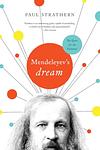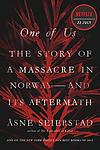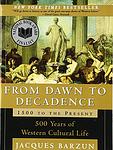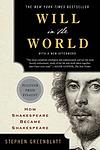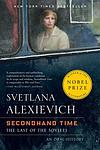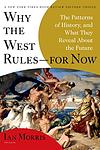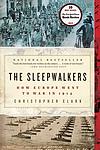The Greatest "European History" Books Since 2000
Click to learn how this list is calculated.
This list represents a comprehensive and trusted collection of the greatest books. Developed through a specialized algorithm, it brings together 300 'best of' book lists to form a definitive guide to the world's most acclaimed books. For those interested in how these books are chosen, additional details can be found on the rankings page.
Genres
European History is a category of books that focuses on the historical events, people, and cultures of Europe. It covers a wide range of topics, including the ancient civilizations of Greece and Rome, the Middle Ages, the Renaissance, the Enlightenment, and the modern era. This category of books explores the political, social, economic, and cultural developments that have shaped Europe over the centuries, from the rise and fall of empires to the impact of wars and revolutions. It provides readers with a deeper understanding of the rich and complex history of Europe and its influence on the world.
Countries
Date Range
Reading Statistics
Click the button below to see how many of these books you've read!
Download
If you're interested in downloading this list as a CSV file for use in a spreadsheet application, you can easily do so by clicking the button below. Please note that to ensure a manageable file size and faster download, the CSV will include details for only the first 500 books.
Download-
1. Postwar by Tony Judt
"Postwar" is a comprehensive analysis of the history of Europe from the end of World War II to the early 21st century. The book examines the major political, cultural, social, and economic changes that have shaped the continent, including the Cold War, the rise and fall of the Soviet Union, the rebuilding of Western Europe, and the challenges of integrating Eastern Europe into the European Union. It also delves into the impact of these events on the daily lives of Europeans, exploring themes of memory, identity, and the struggle to come to terms with the past.
-
2. Sapiens: A Brief History of Humankind by Yuval Noah Harari
This book provides a comprehensive exploration of the history of the human species, tracing back from the earliest forms of Homo Sapiens to the modern day. It delves into evolutionary biology, the development of cultures and societies, and the rise of major ideologies and technologies. The book also discusses the future of the species, posing thought-provoking questions about our roles and responsibilities in a rapidly changing world.
-
3. Mendeleyev's Dream by Paul Strathern
This book traces the history of chemistry from the ancient philosophers' wild speculations about the composition of the universe to the creation of the periodic table by Dmitri Mendeleyev. Through a blend of storytelling and science, it explores the development of atomic theory and chemical elements, leading up to Mendeleyev's groundbreaking dream in which he envisioned the periodic table in its modern form. The narrative delves into the lives and discoveries of key figures in the field of chemistry, illustrating how their work contributed to our understanding of the elements that make up the world around us.
-
4. Say Nothing by Patrick Radden Keefe
This book is a gripping exploration of the Troubles in Northern Ireland, focusing on the disappearance of Jean McConville, a mother of ten who was abducted by the Irish Republican Army (IRA) in 1972. The narrative weaves together the stories of several key figures in the IRA, including Dolours Price, an IRA member who became disillusioned with the organization, and Brendan Hughes, a former IRA commander. The book delves deep into the political and personal complexities of the conflict, revealing the long-lasting trauma and moral ambiguities that continue to haunt those involved.
-
5. One Of Us: The Story Of Anders Breivik And The Massacre In Norway by Asne Seierstad
One of Us by Asne Seierstad is a detailed account of the 2011 terrorist attack in Oslo, Norway, carried out by Anders Breivik. The book explores Breivik's background, motives, and planning leading up to the attack, as well as the aftermath and impact on the survivors and families of the victims. Seierstad's thorough research and interviews with those affected provide a comprehensive and emotional portrayal of the tragedy, shedding light on the complexities of extremism and the devastating consequences of hate.
-
6. London: The Biography by Peter Ackroyd
This book is a comprehensive exploration of the city of London, from its ancient origins to the modern era. The author delves into the city's rich history, culture, and unique character, examining its evolution through various lenses such as crime, religion, commerce, education, and entertainment. The narrative is brought to life with fascinating anecdotes, vivid descriptions, and a wealth of historical detail, providing an immersive and engaging portrait of one of the world's most iconic cities.
-
7. Catherine The Great: Portrait Of A Woman by Robert K. Massie
This biography provides an in-depth look at the life of the longest-reigning female leader of Russia, tracing her journey from a minor German princess to the powerful Empress of Russia. It delves into her political achievements, her efforts to modernize Russia, and her numerous romantic liaisons, all set against the backdrop of the opulence and intrigue of the 18th-century Russian court. The book paints a vivid portrait of a complex woman who wielded her intelligence and charisma to navigate the treacherous waters of court politics, expand her empire, and become one of the most influential figures in European history.
-
8. From Dawn To Decadence : 1500 To The Present by Jacques Barzun
This book offers a sweeping overview of Western cultural life from the Renaissance to the early 21st century. It delves into the pivotal events, ideas, and personalities that have shaped the modern world, exploring how cultural movements and the evolution of thought have influenced society's development. The narrative weaves through various disciplines, including art, music, politics, and science, to provide a comprehensive understanding of the forces that have led to both the achievements and challenges of Western civilization. Through a rich tapestry of historical analysis, the work invites readers to reflect on the complexity and dynamism of the human experience over the last five centuries.
-
9. The Great Divergence by Kenneth Pomeranz
This book challenges traditional views on the rise of the Western world's economic dominance, arguing that until the late 18th century, parts of Europe, China, Japan, and the Islamic world were similarly advanced. The author contends that geographical and ecological factors, rather than inherent cultural or technological superiority, played a crucial role in Europe's industrialization. Specifically, the availability of coal in Britain and the exploitation of the New World's resources are highlighted as pivotal in creating the "Great Divergence" between the West and the rest of the world. Through this lens, the book reevaluates the roots of global inequality and the factors that have shaped the modern economic landscape.
-
10. Will In The World: How Shakespeare Became Shakespeare by Stephen Greenblatt
"Will In The World" is a biography of Shakespeare that explores how he became one of the greatest writers in history. Stephen Greenblatt delves into the political and cultural influences of Elizabethan England, as well as the personal experiences and relationships that shaped Shakespeare's life and work. Through a combination of historical research and literary analysis, Greenblatt paints a vivid portrait of Shakespeare's world and the man who transformed it with his words.
-
11. Secondhand Time: The Last of the Soviets by Svetlana Alexievich
"Secondhand Time: The Last of the Soviets" is a compilation of personal narratives from individuals who lived through the transformation of the Soviet Union to modern Russia. The book provides a vivid and emotional portrayal of the experiences of ordinary people during this period of significant societal and political change. The author uses these narratives to explore themes such as the impact of political ideology on individual lives, the nature of memory and history, and the enduring effects of trauma and loss.
-
12. Thomas Mann Heinrich Mann by Helmut Koopmann
The book provides a comprehensive study of the lives and works of two prominent German literary figures, who were also brothers. It delves into their complex relationship, contrasting ideologies, and individual contributions to literature and culture. The author examines their personal and professional journeys, exploring how their differing views on art, politics, and society reflected the broader intellectual and historical currents of their time. Through a detailed analysis of their novels, essays, and other writings, the book offers insights into the brothers' influence on each other and on the literary world, highlighting their lasting legacy in the context of German and world literature.
-
13. The Ordeal Of Elizabeth Marsh: A Woman In World History. by Linda Colley
"The Ordeal of Elizabeth Marsh" by Linda Colley tells the story of a remarkable woman who lived in the 18th century and traveled the world, experiencing various cultures and societies. Elizabeth Marsh was born into a wealthy family in England but faced many challenges throughout her life, including being kidnapped in Morocco and facing financial ruin. Colley uses Marsh's story to explore themes of gender, power, and imperialism, and to shed light on the experiences of women in world history.
-
14. Europe Central by William T. Vollmann
The novel explores the moral decisions made by individuals during the most challenging circumstances, specifically focusing on the Eastern Front during World War II. It presents a series of interconnected stories revolving around key historical figures and events, such as the siege of Leningrad, the Soviet invasion of Germany, and the lives of famous composers and artists during this period. The book delves into the complexities of love, betrayal, sacrifice, and survival in the face of totalitarian regimes and war, highlighting the individual's struggle against the overwhelming forces of history.
-
15. Why the West Rules - For Now: The Patterns of History, and What They Reveal About the Future by Ian Morris
This book is a comprehensive exploration of the historical and cultural patterns that have led to Western dominance in the world. The author uses a broad range of evidence from archaeology, genetics, and linguistics to trace the development of East and West from prehistoric times to the present, arguing that physical geography, rather than culture, religion, or great men, is the primary driving force behind the rise of the West. The book also offers a forecast for the future, predicting a shift in global power from the West to the East.
-
16. Lords of Finance: The Bankers Who Broke the World by Liaquat Ahamed
The book offers an in-depth analysis of the events leading up to the Great Depression from the perspective of four central bankers from the United States, Britain, France, and Germany. The author argues that these individuals, through their decision-making and policies, inadvertently contributed to the economic turmoil of the 1930s. The book provides a historical examination of the global financial system, monetary policy, and the role of central banks, ultimately highlighting the human factor in economic catastrophes.
-
17. Gulag: A History by Anne Applebaum
"Gulag: A History" provides an in-depth historical account of the Soviet Union's forced labor camp system, known as the Gulag. The book explores the inception of these camps during the reign of Vladimir Lenin, their expansion under Joseph Stalin, and their eventual decline and closure. It also delves into the daily lives of the prisoners, their hardships, and the brutal conditions they endured. The book is based on a wealth of archival material, personal interviews, and memoirs, offering a comprehensive understanding of one of the darkest periods in human history.
-
18. Apollo’s Angels: A History Of Ballet by Jennifer Homans
"Apollo's Angels: A History of Ballet" by Jennifer Homans is a comprehensive and fascinating exploration of the history of ballet, tracing its origins in the French courts of the 17th century to its modern-day global prominence. Homans delves into the cultural and social contexts that shaped ballet over the centuries, examining the roles of gender, politics, and artistic innovation. She also provides insightful analyses of the most important ballets and choreographers throughout history, highlighting their contributions to the art form. A must-read for anyone interested in the history of dance and the arts.
-
19. Collapse by Jared Diamond
"Collapse" is an exploration of why certain societies throughout history have thrived while others have deteriorated and collapsed. The book delves into environmental problems, climate change, rapid population growth, and unwise political decisions as factors that contribute to the downfall of a civilization. The author uses examples from history such as the Mayans, the Vikings in Greenland, and modern examples like Rwanda and Haiti, to illustrate his points. It serves as both a historical analysis and a warning for modern societies to learn from the past in order to avoid a similar fate.
-
20. A History of the World in 100 Objects by Neil MacGregor
This book offers a unique perspective on world history, telling the story of humanity through the examination of 100 man-made objects. The author, a museum director, uses items from the British Museum, ranging from a 2 million-year-old Olduvai stone cutting tool to a contemporary credit card, to explore various themes such as trade, religion, art, science, and politics. The book provides a fascinating lens through which to view the evolution of human civilization.
-
21. The Sleepwalkers: How Europe Went To War In 1914 by Christopher Clark
"The Sleepwalkers" by Christopher Clark is a comprehensive account of the events leading up to World War I. The book argues that the war was not caused by any one nation or individual, but rather a combination of factors including nationalism, alliances, and miscommunication. Clark explores the complex political landscape of Europe in the early 20th century and the actions of key players such as Kaiser Wilhelm II and Archduke Franz Ferdinand. The book provides a detailed analysis of the events leading up to the war and challenges traditional narratives of blame and responsibility.
-
22. War And Turpentine by Stefan Hertmans
"War and Turpentine" by Stefan Hertmans is a historical novel that follows the life of the author's grandfather, Urbain Martien, who lived through both World War I and II. The book is divided into three parts: Urbain's childhood in poverty-stricken Belgium, his experiences as a soldier in WWI, and his life as a struggling artist after the war. The novel explores themes of love, loss, and the impact of war on individuals and society. Through Martien's story, Hertmans paints a vivid picture of a bygone era and the struggles faced by those who lived through it.
-
23. Empire Of Cotton: A Global History by Sven Beckert
"Empire of Cotton" by Sven Beckert is a comprehensive global history of cotton, exploring its impact on the world economy, politics, and society from the 18th century to the present day. Beckert argues that cotton played a crucial role in the development of capitalism, colonialism, and imperialism, and that its production and trade were intimately linked to the exploitation of labor, the growth of slavery, and the rise of industrialization. The book offers a fascinating and thought-provoking perspective on the complex and often violent history of cotton and its enduring legacy in the modern world.
-
24. Stasiland by Anna Funder
This non-fiction work delves into the haunting legacy of the Stasi, the secret police of the former East Germany, through a series of personal narratives and interviews. The author explores the pervasive surveillance and oppression that characterized the German Democratic Republic, weaving together the stories of those who resisted the regime, those who worked for it, and those who were its victims. The book serves as a poignant examination of the human spirit under the strain of totalitarianism, revealing the scars left by a society where privacy was eradicated and trust was a commodity few could afford.
-
25. Russia Is Burning: Poems Of The Great Patriotic War by Maria Bloshteyn
"Russia Is Burning: Poems Of The Great Patriotic War" is a poignant collection of poems that captures the raw emotions and experiences of the Russian people during World War II. Through powerful and vivid imagery, the author delves into the devastating impact of the war on both soldiers and civilians, painting a haunting portrait of loss, resilience, and the indomitable spirit of the Russian people in the face of unimaginable suffering.
Reading Statistics
Click the button below to see how many of these books you've read!
Download
If you're interested in downloading this list as a CSV file for use in a spreadsheet application, you can easily do so by clicking the button below. Please note that to ensure a manageable file size and faster download, the CSV will include details for only the first 500 books.
Download

